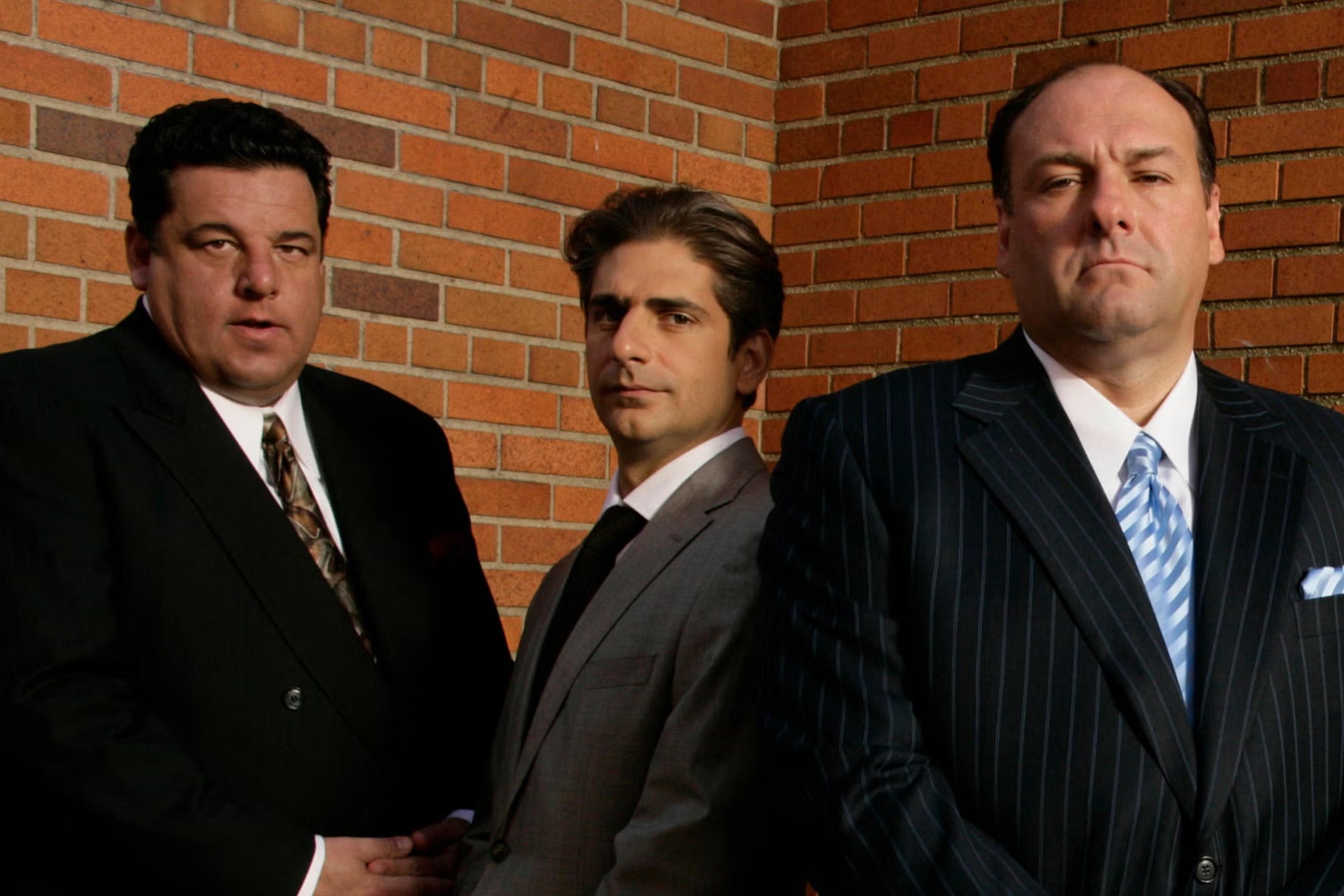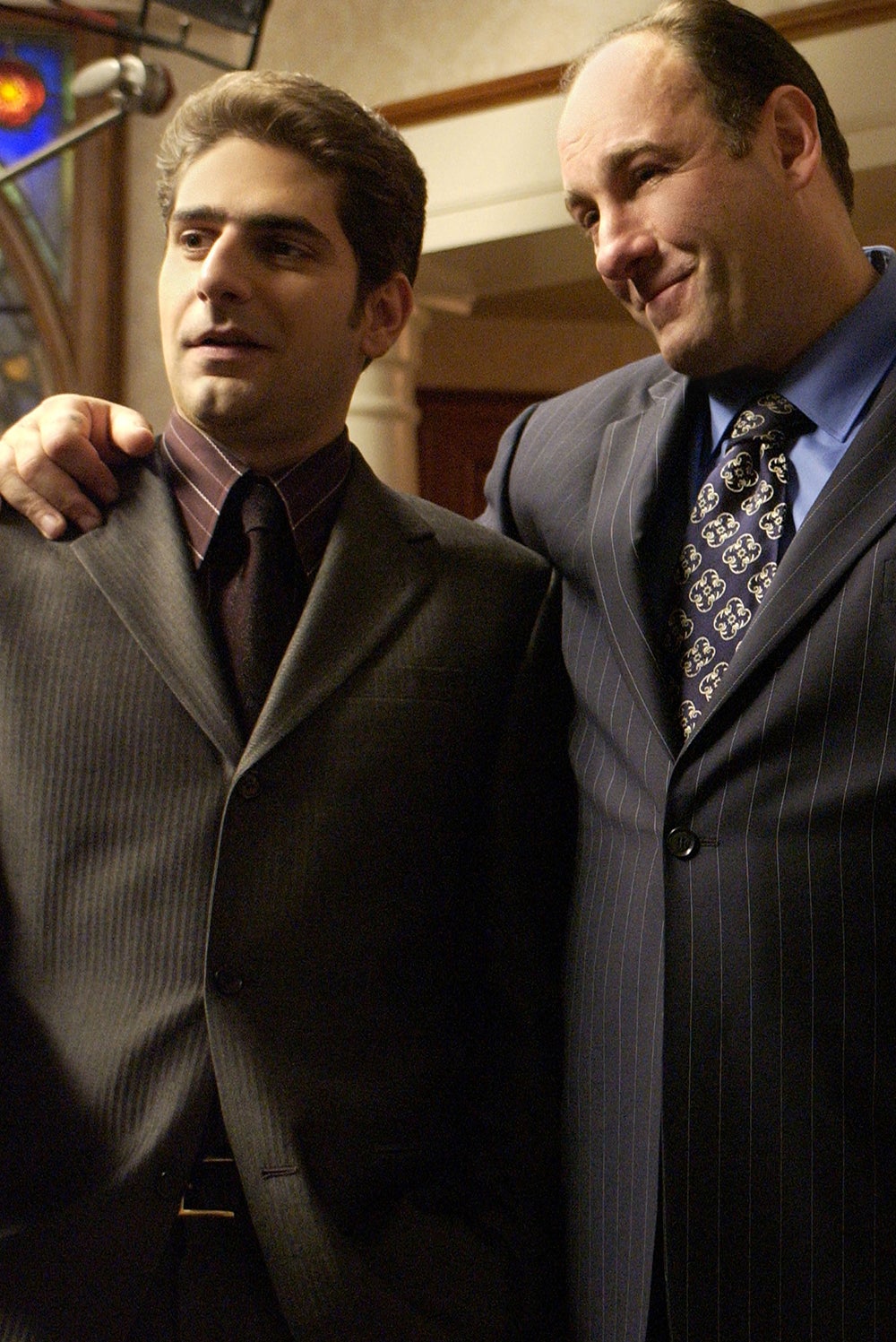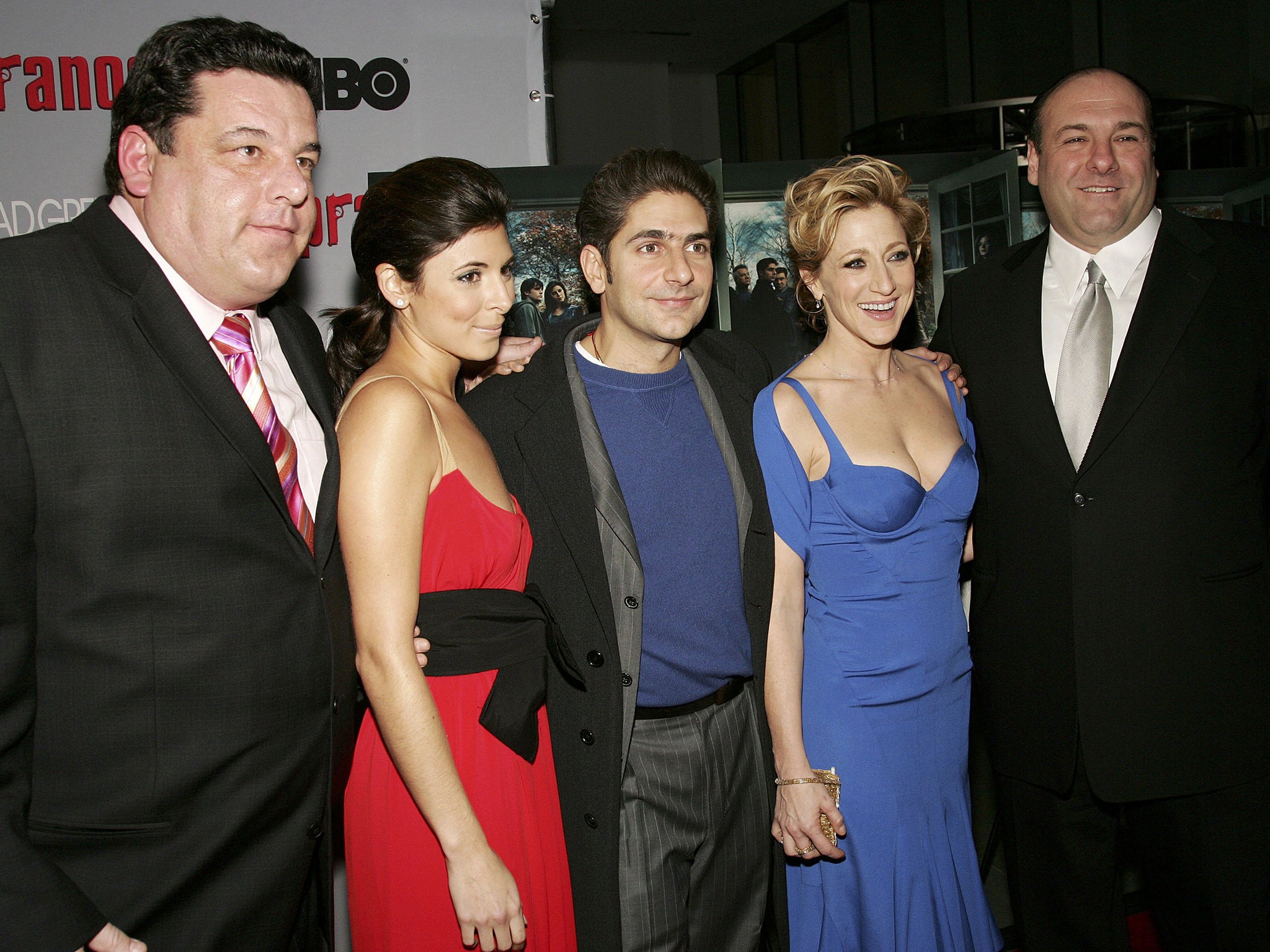Sopranos’ Michael Imperioli and Steve Schirripa: ‘James Gandolfini never felt comfortable being the centre of attention’
Best known as Christopher Moltisanti and Bobby Baccalieri on the juggernaut mob drama, the co-stars and real-life BFFs speak to Adam White about the show’s Covid-era renaissance, why James Gandolfini would be lying low if he were alive today, and their very different takes on that infamous ending


Your support helps us to tell the story
From reproductive rights to climate change to Big Tech, The Independent is on the ground when the story is developing. Whether it's investigating the financials of Elon Musk's pro-Trump PAC or producing our latest documentary, 'The A Word', which shines a light on the American women fighting for reproductive rights, we know how important it is to parse out the facts from the messaging.
At such a critical moment in US history, we need reporters on the ground. Your donation allows us to keep sending journalists to speak to both sides of the story.
The Independent is trusted by Americans across the entire political spectrum. And unlike many other quality news outlets, we choose not to lock Americans out of our reporting and analysis with paywalls. We believe quality journalism should be available to everyone, paid for by those who can afford it.
Your support makes all the difference.James Gandolfini finally felt free of Tony Soprano. As the New Jersey mobster with a furrowed brow, blood on his hands and existential ennui turning over in his belly, he had transformed television. The Sopranos was a juggernaut about a crime family in crisis, its star permanently enshrined in pop culture lore. But it came at a cost. “He became a household name, and it affected him,” says Steve Schirripa, aka the show’s loyal, lasagne-loving foot soldier Bobby Baccalieri. “He never felt comfortable being the centre of attention.”
A few weeks before Gandolfini died in 2013 – of a heart attack in an Italian hotel room at the age of 51 – his co-star Michael Imperioli had seen him for what would prove to be the last time. He seemed different. The men were close, their on-screen dynamic – he played Tony’s nephew, the deferential and ambitious Christopher Moltisanti – replicated off-camera. “He was really happy,” Imperioli says, solemnly. “It was six years after the finale had aired, and he felt that some of the craziness was calming down for him, some of the identification with the role. He finally had himself back.”
Of course, Gandolfini died unaware that The Sopranos would soon blow up again. Today, the series feels oddly inescapable – arguably even more so than between 1999 and 2007, when it was first broadcast on HBO in the US and Channel 4 in the UK. It has an ever-growing Gen-Z fanbase. So substantial was its newfound popularity in 2020 – WarnerMedia claimed it experienced a 179 per cent rise in viewers via US streaming service HBO Now – that it essentially sponsored the early months of the pandemic. Over 100,000 people follow Sopranos Out of Context – a Twitter account dispensing random screenshots from the show. There’s also been The Many Saints of Newark – a prequel film starring Gandolfini’s son Michael, released in cinemas in September – while three separate podcasts devoted to the show and fronted by former cast members are currently running. Imperioli and Schirripa – who together host one of them, Talking Sopranos – have now released their own book, Woke Up This Morning, a trivia-laden oral history of the series made up of new material and conversations from the podcast.
What would Gandolfini have made of it all? Imperioli chuckles. “I think it would annoy him!” Gandolfini was notoriously press-shy, refusing to appear on talk shows or give many interviews. “I think he’d be proud as hell of his son. I think that would make him really happy. But if [the show’s resurgence] put him in a position where people wanted him to speak to the press or go to events, I doubt he would do it.”
Imperioli is speaking from New York, his head bowed and his sunglasses tinted orange, the decor of his apartment – marble busts, golden objets – so ritzy it looks like Christopher’s glamorous girlfriend Adriana was responsible for it. A few weeks later, Schirripa appears over Zoom from New York with a blue curtain draped behind him, a little more modest than his one-time co-star and present-day podcast co-host. The separate conversations prove helpful. On Talking Sopranos, the pair have an odd-couple back-and-forth: Imperioli the thoughtful raconteur, Schirripa the interjecting motormouth quick with a dick joke and some casual Robert De Niro slander. They’re a hoot together, yet you imagine difficult to wrangle.
Imperioli sensed The Sopranos had become a phenomenon again in 2019, when he was approached by a fan in Central Park: a Scottish teenager, aged around 19, and quick to show off the Christopher tattoo on his leg. “It seems like there’s no casual fans of The Sopranos,” Imperioli says. “It’s either people who’ve never seen it, or people who are kind of nuts about it.” Schirripa hasn’t encountered anyone with a Bobby tattoo just yet. He imagines it’d be a bit weird. “I mean, I had favourite shows growing up, but I don’t want Seinfeld on my arm,” he scoffs.
Many theories have been floated as to why The Sopranos has become massive again: it’s a dramatic reflection of a society in terminal decline; unlike in 1999, we’re all just as depressed, restless and angry as its characters now; everyone’s had it on their mental watchlist and finally gave it a shot when the world closed down. Imperioli thinks it tapped into socio-political themes that only became overt later. “It’s about the emptiness of the American Dream,” he says. “The sham of it all: consumer culture, materialism, making more money, getting better jobs and houses than the prior generation. At the end of the day, it’s not going to fulfil your spirit. It’s hollow and empty, and we’ve been convinced that it’s more important than anything else.”

Whatever the explanation, the resurgence has also unlocked aspects of the show’s history that were otherwise forgotten. The week I speak to Imperioli, an extract from a forthcoming oral history of HBO appears online, one that doesn’t paint the easiest portrait of Gandolfini. The book describes the star’s compassion and vulnerability, but also his struggles with substance abuse, clashes with HBO’s top brass, and times in which he held up production of the series. Woke Up This Morning doesn’t go as far into Gandolfini’s struggles, even if it occasionally gestures towards drama on the set. In light of Gandolfini’s death, does Imperioli feel compelled to protect his memory?
“Absolutely, and I would extend that to any friend that I consider close,” he says. “There were times when we didn’t get along, especially if it was late at night and we were, you know, in our cups. We could be idiots as much as anybody else, but at the end of the day, he was just about as good a guy as I’ve ever worked with.”

Watch Apple TV+ free for 7 days
New subscribers only. £8.99/mo. after free trial. Plan auto-renews until cancelled

Watch Apple TV+ free for 7 days
New subscribers only. £8.99/mo. after free trial. Plan auto-renews until cancelled
He remembers sensationalist stories cropping up in the tabloids after Gandolfini died, and being furious about them. “They were talking about this thing or that thing, or that he didn’t show up to work, and I was like: really? The guy just died two days ago and we’re gonna go into that? I found it really tacky and distasteful. Do you think his kid wants to hear that?” He sighs. “We know we’re flawed. He wasn’t a saint, nor am I, and nor was anybody on that show. Nor is anybody I know. So what’s the point?”
That the cast could fight one another and then rapidly mend fences makes sense: they were a family. Woke Up This Morning goes into detail about the casting process behind the show. Creator David Chase’s only real requirement was that all the major cast had to be Italian-American – a rule that, ultimately, didn’t apply to the show’s child actors – but an unspoken sense of gravity also linked them. The far majority of the cast were jobbing, salt-of-the-earth New York actors back then. Others had lived lives of high drama already. Actor Tony Sirico (Paulie Walnuts) had spent 20 months in New York’s Sing Sing Prison, Steven Van Zandt – aka Silvio Dante – emerged from Bruce Springsteen’s E Street Band, Big Pussy actor Vincent Pastore ran nightclubs, while Schirripa formerly managed the entertainment at a Vegas casino. “We all had the same working-class backgrounds,” he says. “Nobody came from that LA trust fund daddy scene.”

Imperioli isn’t sure that such a cast would be assembled today. He mentions two shows that emerged in the shadow of The Sopranos: Mad Men and Breaking Bad, the former led by Jon Hamm – a total unknown when it began – and the latter by Bryan Cranston, previously the dad from Malcolm in the Middle. “Today, they’d probably want a star rather than some character actor,” he says. “Look at how Apple did The Morning Show with Jennifer Aniston and Reese Witherspoon. Or look at Amazon with Hunters – it’s got Al Pacino! What worked in television back then was the unknown. Now it’s kind of like the studio system of Hollywood. They’re trying to make it bankable before they even start by having a big name attached.”
It’s also tough to imagine any of those celebrity-driven shows being as debated in the future as just a few seconds of The Sopranos, namely its eternally polarising last scene. An infamous smash-cut to black instead of the expected point-of-view shot as Tony looks up from the diner booth as he prepares to eat dinner with his family – which could hint at his execution or absolutely nothing at all – still has fans at each other’s throats 14 years later. Imperioli is convinced he was killed, Schirripa not so much. “I always thought Tony Soprano lived!” he says. “He’s alive and well and with his family. I see the reasons for thinking he dies – and I don’t disagree with them – but I’m just hopeful that they didn’t kill him in front of his family. Or, god forbid, kill his family.”
It’s a stance that indirectly speaks to the nuance of The Sopranos and its characters. In a show about a vicious killer, his morally compromised wife, stroppy daughter and a**hole son, the thing we’d absolutely hate to see is any of them get whacked.
‘Woke Up This Morning’ by Michael Imperioli and Steve Schirripa is published in the UK by 4th Estate and is out now



Join our commenting forum
Join thought-provoking conversations, follow other Independent readers and see their replies
Comments